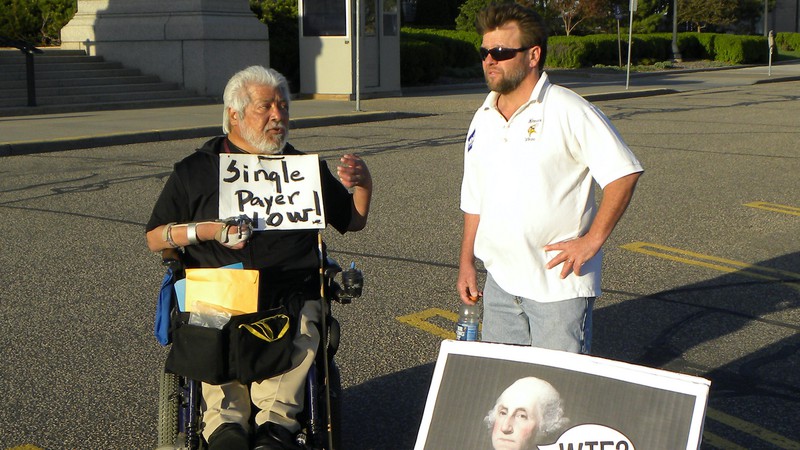But the bill doesn’t move the state toward single payer fast enough, other healthcare advocates say.

Gov. Newsom has signed a bill moving the state toward a single-payer health care system. Not all single-payer backers are happy. Fibonacci Blue / Wikimedia Commons C.C. Share Alike 2.0 Generic license
California took another step—at least a potential step—toward becoming the first state in the country to provide health insurance to every resident through a state-run, single payer system on Oct. 7. But not all single-payer advocates were happy about it. In fact, a significant faction of them remains upset.
The California Nurses Association, which has long been the leading single-payer advocacy group in the state, dismisses SB 770 as an extraneous measure that only slows down the march toward a single-payer system.
Why? The bill signed by Gov. Gavin Newsom, Senate Bill 770, takes a slow-walking approach toward creating a single-payer system—18 months after a far more sweeping bill to implement a single payer system called CalCare died in the legislature without a vote. In fact, SB 770 represents the 10th attempt at creating single payer health insurance in California since 1994.
All, obviously, have ended in failure.
What Is Single Payer Health Insurance?
Under the current system, a multitude of entities ranging from private insurance companies to government agencies to the patients themselves pay for health care services. Under a single-payer system, as the name implies, only one entity pays the bills. That’s usually the government.
Single payer is often accused by its opponents of being “socialized medicine.” But there’s a big difference. Under a socialized health care system, the government not only picks up the tab for services, it owns and operates all health care facilities. Doctors, nurses and all medical professionals are on the government payroll.
Even though the government wouldn’t own health care facilities, a single-payer system would replace private health insurance, essentially putting those companies out of business. The defunct CalCare plan contained provisions allowing for workers in the private health insurance industry who lose their jobs to receive financial support and job retraining.
The money to cover health care costs in a single payer system would come from taxes, but most health care costs are already covered by the government through programs such as Medicare and Medicaid. The funds that now go into those programs would be redirected to the single payer system, once it’s put in place.
New Law Requires State to Issue Reports
Redirecting those funds is at the heart of SB 770. Any state that wants to use Medicare and Medicaid money for its own single-payer system must obtain permission, in the form of a waiver, from the federal government. The bill directs the California Health and Human Services Agency secretary (currently Dr. Mark Ghaly) to submit a report by June 2025 detailing how California would obtain that waiver.
The health secretary must also submit a preliminary report by January of 2025 on how the state would implement either a single-payer system or some other form of universal health coverage. The final report is due by November of that year.
No other state has a single-payer program. Vermont passed a bill to create one in 2011. But three years later, then-Gov. Phil Shumlin—after campaigning on a promise to put the system in place—declared that it was “not the right time” for a single-payer system, and put the brakes on the whole process.
But the California Nurses Association, which has long been the leading single-payer advocacy group in the state, dismisses SB 770 as an extraneous measure that only slows down the march toward a single-payer system. Carmen Comsti, a policy specialist for the nurses’ union, told the Los Angeles Times that the bill was unnecessary because the research it requires the state to do has already been done.
SB 770 is simply a waste of time and money, he told the paper. And Sandy Reding, the CNA president, said the bill represents a “complete betrayal of nurses’ fight for a single-payer health care policy,” according to a report by the political site Roll Call.
The CNA supports a different bill, Assembly Bill 1690, which consists of just one sentence: “It is the intent of the Legislature to guarantee accessible, affordable, equitable, and high-quality health care for all Californians through a comprehensive universal single-payer health care program that benefits every resident of the state.”
But AB 1690 has not moved through the legislature at all.